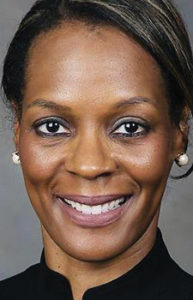Julia McDill had decided not to pursue her master’s degree.
The seven-year veteran teacher at Franklin Elementary still owes student loan debt from when she earned her bachelor’s in elementary education at the Mississippi University for Women.
Adding to that debt just wasn’t feasible.
Similarly, McDill had pondered earning her National Board certification, something that would both boost her salary long term and provide her the intensive, reflective teacher training the program’s name implies. But again, entering that program typically takes a pricey $3,000 to $4,000 up-front investment from the teacher. It wasn’t possible for her.
Until now.
Columbus Municipal School District is using Elementary and Secondary School Emergency Relief (ESSER) funds from the COVID-19 pandemic to pay the cost for teachers wanting National Board certification over the next three years. McDill, a fourth-grade math teacher, is one of the first 27 teachers to take the district up on the offer.
“When the district offered this opportunity, I jumped at the chance,” McDill said. “This will help me hone my skills and perfect my craft.”
It will also add $6,000 to her annual salary once she completes the certification process.
CMSD is partnering with Mississippi State University’s World Class Teacher program to provide the professional development associated with National Board certification. The process takes between a year and 18 months to complete, CMSD Superintendent Cherie Labat said, and trains/assesses teachers in four key areas: content knowledge, differentiation in instruction, teaching practice and learning environment, and effective and reflective practices.

“It helps teachers find the strengths and weaknesses in their own instruction continuously,” Labat said. “… I also feel like the professional development of them working through the process will be advantageous to us as far as improving instruction and student achievement.”
Now, CMSD has only four National Board certified teachers. Labat said the district hopes this incentive will add 100 to that total over three years — more than 40 percent of the district’s teachers.
By comparison, only 13.7 percent of teachers in Mississippi public school districts were National Board certified in 2019 — the fourth highest percentage in the country.
“I know from experience working in other districts, if you even have 10 percent of your teachers National Board certified, it makes a huge difference,” Labat said.
Labat also cited studies that show kindergartners in Mississippi taught by a National Board certified teacher are 31 percent more likely to achieve a proficient score on reading readiness benchmark exams. Third graders are 11 percent more likely to score proficient on the English and Language Arts exam.
Beyond that, CMSD’s National Board initiative can also help with teacher recruitment and retention, Labat said. To qualify for the training, a teacher needs a minimum of three years experience. Currently, the district employs 87 teachers with fewer than three years experience, and an increasing number of teachers nationwide are leaving the field before they reach the three-year mark.
Not only will the incentive keep the experienced teachers in the district, Labat said, it also puts 40 percent of her teaching workforce into mentorship positions that could keep younger, less experienced teachers in the district as well.
“Sometimes you have a win-win situation,” Labat said. “This is a win-win-win, especially since we can leverage our ESSER dollars to make this happen. … When looking at learning loss over the past year and a half (due to COVID-19), if you’re not investing in instructional quality to improve student achievement and closing the achievement gap, then what are you spending your money on?”
For McDill, working with children has always appealed. She thought elementary education was what she was meant to do, and teaching over the years has confirmed that.
But in addition to her fourth grade math classes, she also is conducting math interventions with fourth and fifth grade students. The National Board process, she said, will especially help her better differentiate instruction among different level learners.
Labat hopes that kind of “reflective” attitude is contagious and encourages more teachers to apply for the incentive.
“If you have the years of experience, it’s an open application process,” she said. “Anybody who meets that criteria and wants to learn and grow student achievement, it’s game on.”
You can read the original piece here
